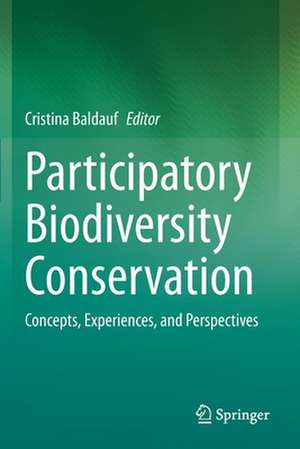Participatory Biodiversity Conservation: Concepts, Experiences, and Perspectives
Editat de Cristina Baldaufen Limba Engleză Paperback – 14 mai 2021
| Toate formatele și edițiile | Preț | Express |
|---|---|---|
| Paperback (1) | 991.52 lei 6-8 săpt. | |
| Springer International Publishing – 14 mai 2021 | 991.52 lei 6-8 săpt. | |
| Hardback (1) | 1002.94 lei 6-8 săpt. | |
| Springer International Publishing – 14 mai 2020 | 1002.94 lei 6-8 săpt. |
Preț: 991.52 lei
Preț vechi: 1209.16 lei
-18% Nou
Puncte Express: 1487
Preț estimativ în valută:
189.73€ • 206.74$ • 159.87£
189.73€ • 206.74$ • 159.87£
Carte tipărită la comandă
Livrare economică 23 aprilie-07 mai
Preluare comenzi: 021 569.72.76
Specificații
ISBN-13: 9783030416881
ISBN-10: 3030416887
Ilustrații: XIII, 237 p. 27 illus., 23 illus. in color.
Dimensiuni: 155 x 235 mm
Greutate: 0.36 kg
Ediția:1st ed. 2020
Editura: Springer International Publishing
Colecția Springer
Locul publicării:Cham, Switzerland
ISBN-10: 3030416887
Ilustrații: XIII, 237 p. 27 illus., 23 illus. in color.
Dimensiuni: 155 x 235 mm
Greutate: 0.36 kg
Ediția:1st ed. 2020
Editura: Springer International Publishing
Colecția Springer
Locul publicării:Cham, Switzerland
Cuprins
1. Concepts and evolving perspectives on biodiversity conservation.- 2. Domesticated Nature: The culturally constructed niche of humanity.- 3. The right to food? Protected areas, conservation and access.- 4. The role of local perceptions in environmental diagnosis.- 5. People and nature conservation: Participatory praxis in natural protected areas planning and management.- 6. Policy trends in the recognition of indigenous and local knowledge in Amazonia.- 7. Community-based management of Amazonian biodiversity assets.- 8. Mariculture of macroalgae as a social and environmental alternative in traditional communities located in the semi-arid coastal region of northeastern Brazil.- 9. Challenges for rural livelihoods, participatory agroforestry and biodiversity conservation in a neotropical Mexican MAB reserve.- 10. Participatory monitoring of natural commons in Brazil: Lessons from the literature and the field.- 11. Productive restoration as atool for socio-ecological landscape conservation: The case of “La Montaña” in Guerrero, Mexico.- 12. ATBC’s conservation activities around the world: How effective have our declarations and resolutions been in driving policy change and management responses?.- 13. Avoiding deforestation policies: A socio-political approach.- 14. Participatory biodiversity conservation: What prospects?.
Notă biografică
Cristina Baldauf has a BSc from Universidade Federal do Rio Grande do Sul, MSc from Universidade Federal de Santa Catarina, and PhD from Universidade Estadual de Campinas. Currently, she is Associate Professor at Universidade Federal Rural do Semi-árido in Brazil, where she leads the Ethnoecology and Biodiversity Laboratory. Her research explores the relationship between traditional/local livelihoods and conservation using interdisciplinary approaches. She has an extensive experience in projects related to participatory biodiversity conservation in distinct regions and biomes.
Textul de pe ultima copertă
It has long been claimed that addressing biodiversity loss and other environmental problems demands a better understanding of the social dimensions of conservation; nevertheless, the active participation of indigenous peoples and local communities (IPLCs) in conservation initiatives is still a challenging and somehow controversial issue. In this context, this book hopes to give voice to other perspectives related to biodiversity conservation beyond the “fortress conservation” model and emphasize one of the pillars of democracy – popular participation. It covers a wide range of environments and issues of special significance to the topic, such as the expansion of culturally constructed niches, protected areas and food security, community-based management, participatory agroforestry, productive restoration and biocultural conservation. The contents also explore the limitations and shortcomings of participatory practices in protected areas, the relationship between the global crisis ofdemocracy and the decline of biocultural diversity, as well as present current discussions on policy frameworks and governance systems for effective participatory biodiversity conservation. In sum, this book provides a comprehensive and realistic perspective on the social dimensions of conservation based on a series of interrelated themes in participatory biodiversity conservation. The connections between biocultural conservation and the current political and economic environment are highlighted through the chapters and the book closes with a debate on ways to reconcile human welfare, environmental justice and biodiversity conservation.
Caracteristici
Provides a comprehensive assessment of the potential and challenges of participatory conservation inside and outside protected areas Covers distinct dimensions (ecological, socioeconomic, political) of biodiversity conservation The case studies presented encompass a wide range of sub-themes, environments and regions
